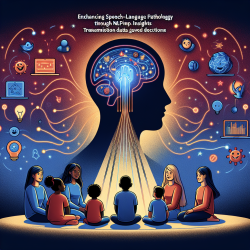Introduction
In the realm of online therapy, data-driven insights are pivotal in shaping effective interventions and improving outcomes for children. A recent research article titled "Suicide by poisoning in Pakistan: review of regional trends, toxicity and management of commonly used agents in the past three decades" provides valuable insights that can be leveraged by practitioners to enhance their skills and encourage further research. This blog explores how the findings of this study can be applied to online therapy services provided by TinyEYE, particularly in school settings.
Understanding the Research Findings
The study highlights alarming trends in suicide by poisoning in Pakistan, with a focus on regional variations and the agents commonly used. It identifies organophosphates, aluminum phosphide, and paraphenylenediamine as predominant agents, with significant variations in their use across different regions. The research underscores the need for psychoeducational campaigns, staff training, and updated policies to regulate the sale of hazardous substances.
Implications for Online Therapy Services
For online therapy providers like TinyEYE, these findings emphasize the importance of tailoring interventions to address specific regional challenges. By understanding the cultural and regional factors influencing suicidal behavior, therapists can develop more targeted and effective interventions. Here are some key takeaways for practitioners:
- Data-Driven Interventions: Utilize data from the study to inform therapy sessions, focusing on regions with higher incidences of suicide by poisoning.
- Cultural Sensitivity: Incorporate cultural and regional nuances into therapy sessions to ensure relevance and effectiveness.
- Collaborative Efforts: Work with local schools and communities to implement psychoeducational campaigns and raise awareness about mental health and suicide prevention.
- Policy Advocacy: Advocate for policies that regulate the sale of hazardous substances and promote mental health education in schools.
Encouraging Further Research
The study opens avenues for further research in understanding the underlying causes of suicidal behavior and the effectiveness of different interventions. Practitioners are encouraged to engage in research collaborations and contribute to the growing body of knowledge in this area. By doing so, they can help develop innovative solutions that address the unique challenges faced by different regions.
Conclusion
Incorporating the insights from this research into online therapy services can significantly enhance the effectiveness of interventions and improve outcomes for children. By focusing on data-driven decisions and cultural sensitivity, practitioners can play a crucial role in suicide prevention and mental health promotion. To read the original research paper, please follow this link: Suicide by poisoning in Pakistan: review of regional trends, toxicity and management of commonly used agents in the past three decades.










